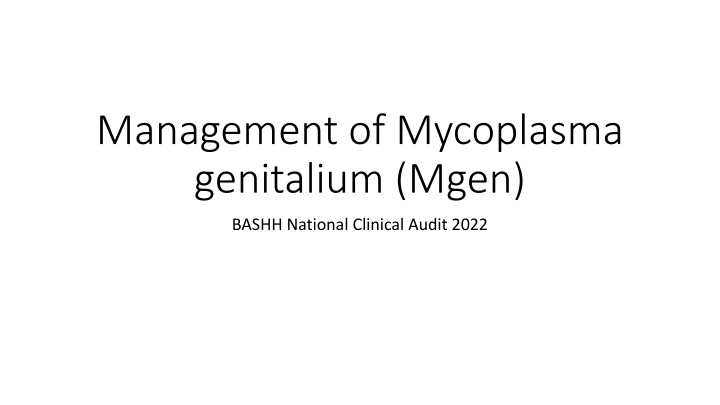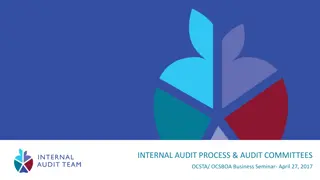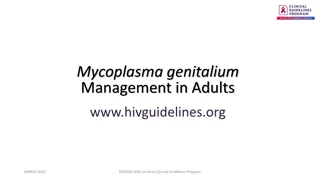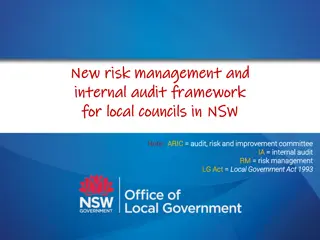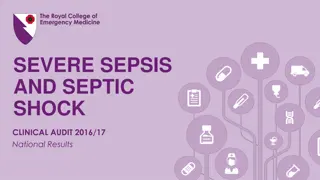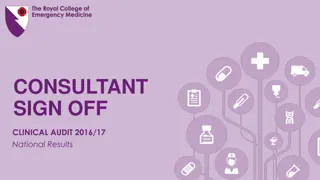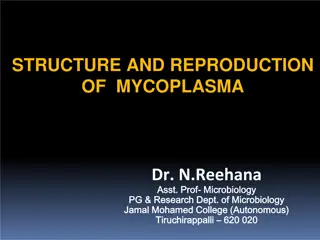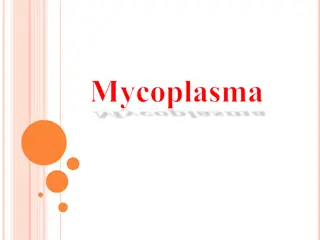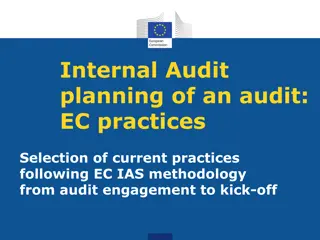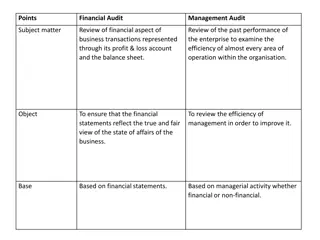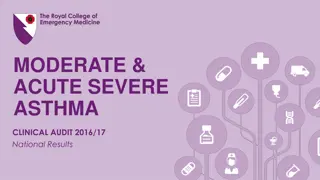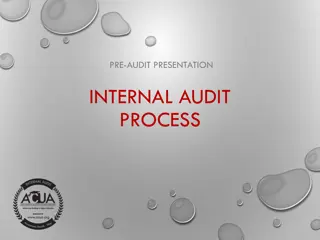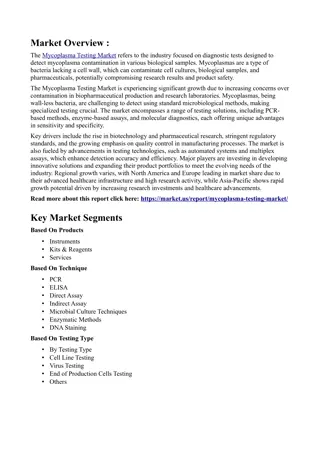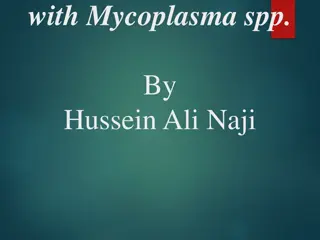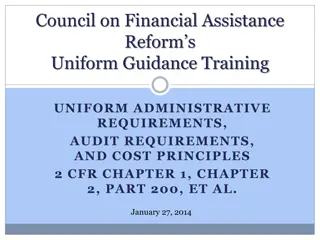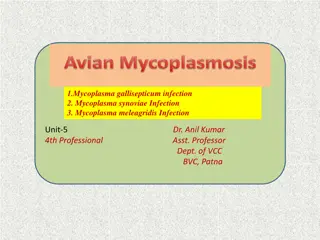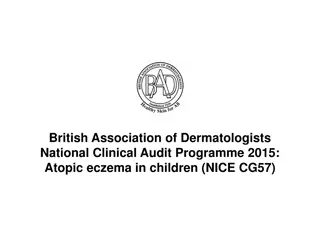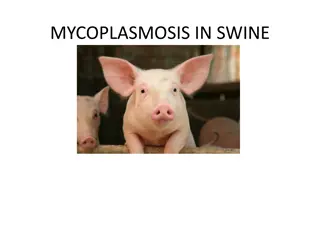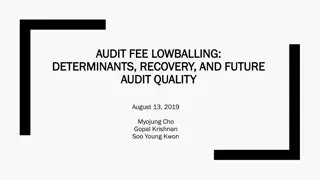Management of Mycoplasma genitalium (Mgen) - BASHH National Clinical Audit 2022
This clinical audit focuses on the management of Mycoplasma genitalium (Mgen) according to the BASHH guidelines. The aim is to assess adherence to the guidelines and the current use of Mgen testing. Methods include surveying local arrangements for Mgen management and conducting case-note reviews of adults with positive Mgen NAAT results. Findings reveal the availability of Mgen testing, resistance testing, and the management of sexual partners. Services without Mgen NAAT testing mainly rely on empirical treatment for suspected cases.
Download Presentation

Please find below an Image/Link to download the presentation.
The content on the website is provided AS IS for your information and personal use only. It may not be sold, licensed, or shared on other websites without obtaining consent from the author.If you encounter any issues during the download, it is possible that the publisher has removed the file from their server.
You are allowed to download the files provided on this website for personal or commercial use, subject to the condition that they are used lawfully. All files are the property of their respective owners.
The content on the website is provided AS IS for your information and personal use only. It may not be sold, licensed, or shared on other websites without obtaining consent from the author.
E N D
Presentation Transcript
Management of Mycoplasma genitalium (Mgen) BASHH National Clinical Audit 2022
Background and aim Introduction of NAAT test for Mgen BASHH Mgen guideline December 2018: objectives included to assist in making the case for funding for testing Audit aim: To assess adherence to this guideline and current use of Mgen testing Originally planned for early 2021 postponed due to pandemic
Methods Survey of local arrangements for Mgen management, to be completed once for every level 3 STI service Case-note review of the last 40 adults (16 or over) at each service with a positive Mgen NAAT between 1 July 2021 and 30 June 2022, or all if fewer than 40 Data collection: September-November 2022 NB: services with no access to Mgen testing, or no positive tests, could not participate in the case-note review
Clinic survey 140 responses
Access to Mgen NAAT and resistance testing Number of services % of services Able to test for Mgen whenever deemed clinically indicated 118 84.3 Some access to Mgen testing but cannot test in all circumstances where clinically indicated 18 12.9 Do not have access to Mgen testing (eg would need to refer elsewhere) 4 2.9 Of 136 services with at least some access to Mgen NAAT: 66 (48.5%) accessed this via a local laboratory, 63 (46.3%) via a national/regional laboratory, and 7 (5.1%) selected other 112 (82.4%) reported access to testing for macrolide-resistance mediating mutations, 16 (11.8%) reported no access, and 8 (5.9%) were unsure
Management of sexual partners of confirmed Mgen, among services with access to test Number % Test for Mgen 68 50.0 Test for Mgen plus empirical treatment while awaiting results 52 38.2 It varies 15 11.0 Not answered 1 0.7
Management at 4 services with no access to Mgen NAAT testing Suspected Mgen: All four services would treat empirically Partner of confirmed Mgen: Two services would refer elsewhere for management Two services would treat empirically
Empirical treatment for Mgen 56 services said they use empirical treatment in some cases (including while awaiting test results for partners): 53 (94.6%) use doxycycline 100 mg bd for seven days followed by azithromycin 1 g orally then 500 mg orally od for two days 1 (1.8%) use moxifloxacin 400 mg orally once daily for ten days 1 (1.8%) said they use the same treatment as for the index case 1 (1.8%) did not answer
Case-note review 2885 individuals from 149 services
Characteristics of audited individuals Current gender Male (including 8 trans) Heterosexual Gay/MSM Bisexual Not stated/not answered Female (including 9 trans) Non-binary or other Not stated Not answered Total Number 1699 1387 260 46 6 1156 2 1 27 2885 % Age 16-19 20-24 25-29 30-34 35 or older Not recorded/not answered Total Number 207 873 774 458 560 13 % 7.2 30.3 26.8 15.9 19.4 0.5 58.9 48.1 9.0 1.6 0.2 40.1 0.1 0.0 0.9 100.0 2990 100.0
Characteristics, continued Ethnic group Number % White 1862 64.5 A British 1632 56.6 B Irish 16 0.6 C Any other White background 214 7.4 Mixed/Multiple 182 6.3 D White and Black Caribbean 76 2.6 E White and Black African 41 1.4 F White and Asian 17 0.6 G Any other mixed background 48 1.7 Asian/Asian British 99 3.4 H Indian 23 0.8 J Pakistani 33 1.1 K Bangladeshi 8 0.3 L Any other Asian background 35 1.2 Black/Black British 419 14.5 M Caribbean 167 5.8 N Black or Black British African 195 6.8 P Any other Black background 57 2.0 R Chinese 13 0.5 S Any other ethnic group 72 2.5 Z Not stated 236 8.2 Not answered 2 0.1 Total 2990 100.0
Indications for first use of Mgen test during relevant episode of care among audited individuals
Resistance testing Guideline recommends that, where possible, all Mgen-positive specimens should be tested for macrolide resistance-mediating mutations Among whom, number (%) with detected resistance mutations Number (%) of audited individuals Done at time of initial diagnosis 1580 (54.8) 759 (48.0) Done after initial diagnosis 192 (6.7) 115 (59.9) Total for whom resistance test done 1772 (61.4) 874 (49.3) Resistance test not available 168 (5.8) NA Not done 880 (30.5) NA Not reported/not answered 65 (2.3) NA
Treatment of Mgen Number (%) of audited individuals Reason if treatment given other than or in addition to doxycycline/azithromycin Number (%) of audited individuals Treatment given Doxycycline 100 mg bd for seven days followed by azithromycin 1 g orally then 500 mg orally od for two days 1913 (66.3) Previous treatment with azithromycin failed 124 (4.3) Suspected macrolide resistance 121 (4.2) Macrolide resistance confirmed by testing 634 (22.0) Moxifloxacin 400 mg orally once daily for ten days 838 (29.0) Complicated Mgen infection 93 (3.2) Moxifloxacin 400 mg orally once daily for 14 days 238 (8.2) Other concurrent infection(s) in addition to Mgen 30 (1.0) No treatment 66 (2.3) More than one reason could be selected More than one regimen could be selected
Test of cure Auditable outcome in guideline: TOC at least five weeks (and no sooner than three weeks) after start of treatment Number (%) of audited individuals TOC done 1625 (56.3) Not done because of pandemic-related service restrictions 16 (0.6) Not done for other reasons 969 (33.6) Not recorded 255 (8.8) Not answered 20 (0.7)
Timing of first TOC after start of treatment, among individuals for whom this was reported as done
Outcome of TOC Mgen not detected treatment successful, number (%) Mgen detected, number (%) Not recorded/ not answered, number (%) Time from start of treatment Equivocal, number (%) 0-3 weeks (N=46) 14 (30.4) 0 (0.0) 31 (67.4) 1 (2.2) 3-5 weeks (N=257) 62 (24.1) 0 (0.0) 190 (73.9) 5 (1.9) Over 5 weeks (N=1311) 266 (20.3) 8 (0.6) 1020 (77.8) 17 (1.3) Not reported (N=11) 3 (27.3) 0 (0.0) 6 (54.5) 2 (18.2) All TOC (N=1625) 345 (21.2) 8 (0.5) 1247 (76.7) 25 (1.5) 66 (19.1%) cases with Mgen detected at TOC were attributed to re-infection 307 (89.0%) cases with Mgen detected at TOC received further treatment
Reporting of treatment failure Auditable outcome in guideline: Confirmed treatment failure by positive TOC should be reported to PHE (now UKHSA) Of 147 individuals with Mgen detected at TOC more than 5 weeks after start of treatment, and not attributed to re-infection or non-adherence, from services in England: 6 (4.1%) were reported to PHE/UKHSA 83 (56.5%) were not 58 (39.5%) respondent was unsure or did not answer
Partner notification Auditable outcome in guideline: PN should be performed and documented according to the BASHH statement (performance standard 97%) Number (%) of audited individuals PN was discussed 2608 (90.4) Not discussed 96 (3.3) Not recorded 147 (5.1) Not answered 34 (1.2)
Provision of written information Auditable outcome in guideline: Individuals should be provided with written information about their diagnosis and management (performance standard 97%) Number (%) of audited individuals Done 1075 (37.3) Not done 667 (23.1) Not recorded 1113 (38.6) Not answered 30 (1.0)
SHHAPT coding Auditable outcome in guideline: New Mgen cases should have SHHAPT code C16 submitted to GUMCAD (performance standard 97%). Number (%) of audited individuals from services in England (N=2758) Done 2565 (93.0) Not required because not a new diagnosis previously submitted 4 (0.1) Not done 141 (5.1) Not recorded 32 (1.2) Not answered 16 (0.6) This may represent a best-case scenario as some services might have used SHHAPT code C16 as the basis for identifying individuals for inclusion in the audit
Conclusions Summary of findings
Access to and use of Mgen testing Guideline recommends: Test for Mgen in all males with NGU, in all individuals with signs and symptoms of PID, and current sexual partners of persons infected with Mgen 84.3% of services reported being able to access Mgen testing whenever clinically indicated However among services with access to testing, only 63.2% and 52.2% routinely test for NSU and for signs and symptoms of PID respectively
Other auditable outcomes and recommendations in guideline Resistance testing was done for 61.4% of individuals (54.8% at time of diagnosis) 49.3% of resistance tests showed macrolide-resistance mediating mutations Treatment appeared broadly consistent with guideline TOC was done for 56.3% of individuals, usually more than 5 weeks from start of treatment 2.8% of first TOC were done earlier than 3 weeks, contrary to guideline Failure of treatment was rarely reported to UKHSA
Other auditable outcomes and recommendations in guideline, continued PN was discussed for 90.4% of individuals: 97% standard not met Provision of written information was done for 37.3% of individuals, not done for 23.1% and not recorded for 38.6%: 97% standard not met SHHAPT code C16 was submitted to GUMCAD for 93.0% of individuals in England (not required for 0.1%): 97% standard not met
Acknowledgements Thank you to everyone who participated in the audit National Audit Group: V Apea (chair), A Blume, H Bradshaw, E Buitendam, H Curtis (co-ordinator), S Davies, L Goodall, E McCarty, R Metcalfe, K Michie, R Omer, N Pal, K Phyu, D Raha, M Ramogi, J Saunders, C Slater, A Sullivan, M Symonds, S Thomas, K Verma, R Viney, H Wallace, S Warren, H Wiggins
